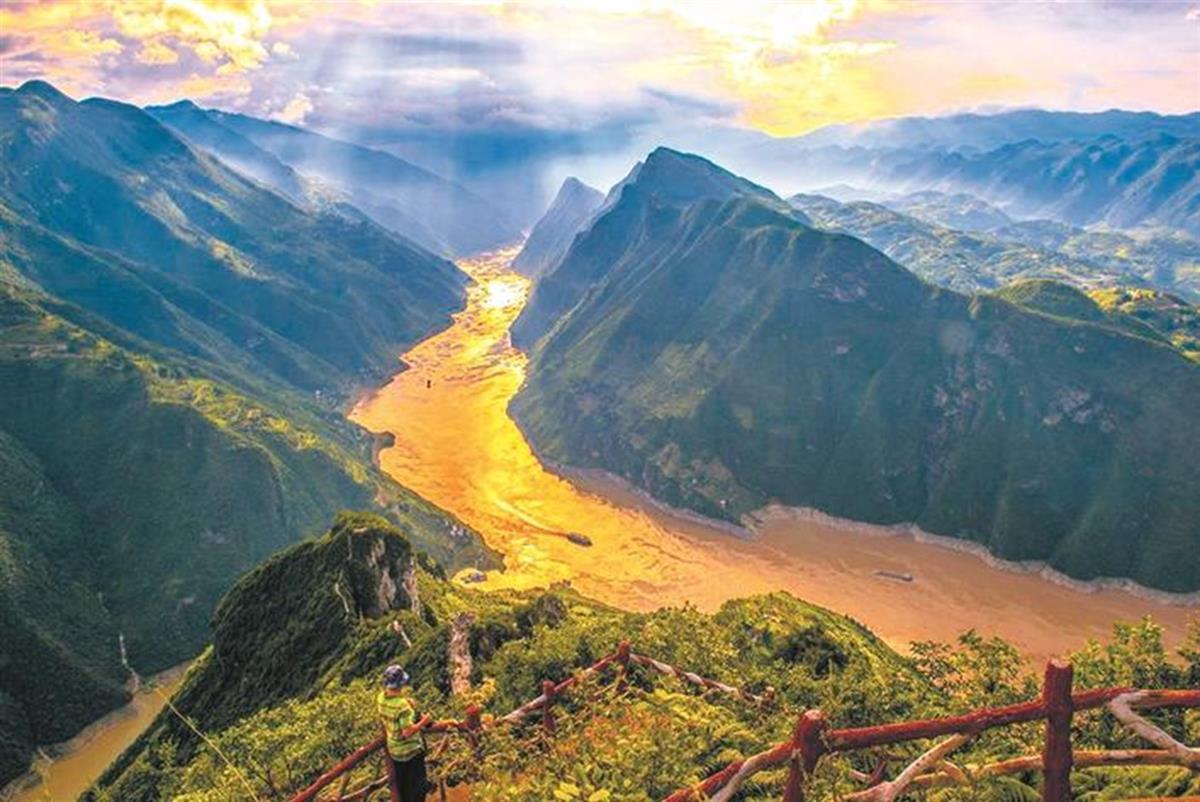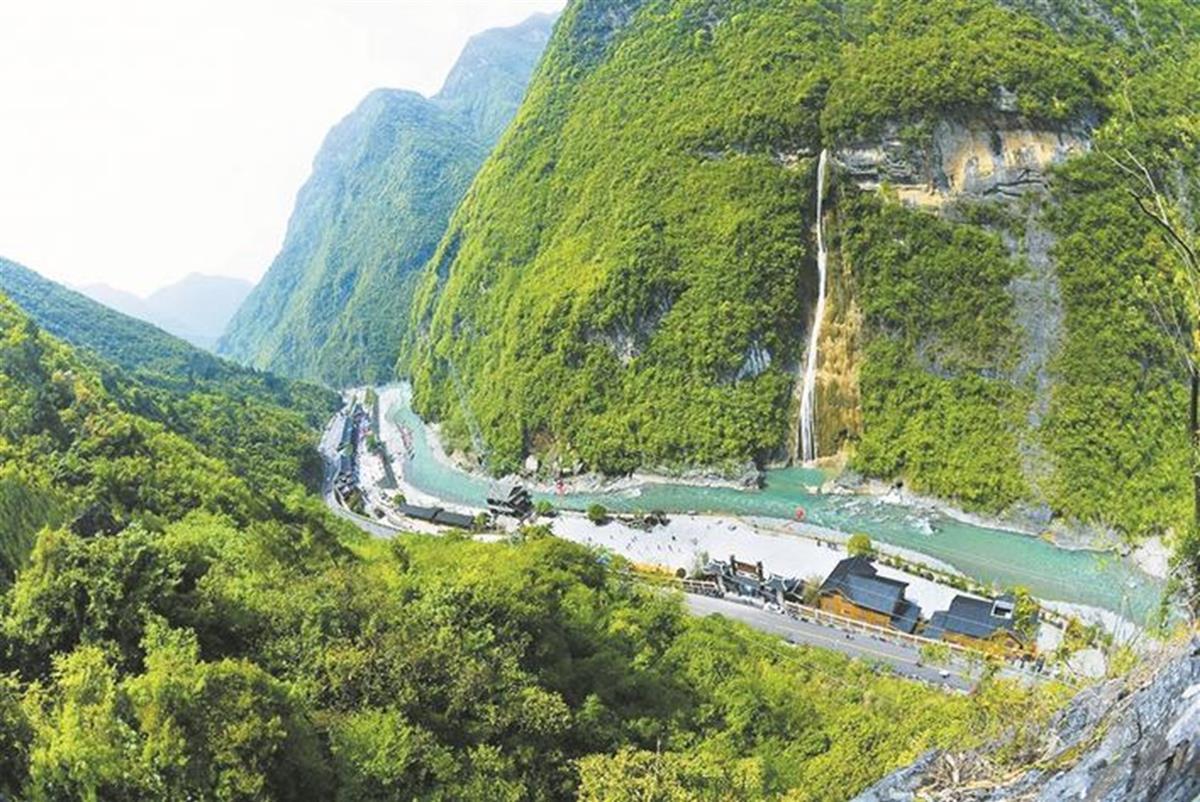“诗的峡谷”在恩施巴东
“Canyon of Poetry”in Badong, Enshi

 李商隐铜像(通讯员供图)Bronze statue of Li Shangyin (an ancient Chinese poet)(Photo by correspondents)
李商隐铜像(通讯员供图)Bronze statue of Li Shangyin (an ancient Chinese poet)(Photo by correspondents)
 巫峡口景区(通讯员谭德魁摄)Wuxiakou Scenic Area(Photo by Correspondent Tan Dekui)
巫峡口景区(通讯员谭德魁摄)Wuxiakou Scenic Area(Photo by Correspondent Tan Dekui)
 神农溪纤夫驿站漂流基地(通讯员郑定荣摄)Qianfu Post House and Rafting Base in Shennongxi(Photo by Correspondent Zheng Dingrong)
神农溪纤夫驿站漂流基地(通讯员郑定荣摄)Qianfu Post House and Rafting Base in Shennongxi(Photo by Correspondent Zheng Dingrong)
楚天都市报极目新闻记者 王佳文
通讯员 谭凤珍 向锋
翻译:刘菲菲,赵姜卉芸,尹珩 (湖北大学)
Jimu News Reporter: Wang Jiawen
Correspondents: Tan Fengzhen, Xiang Feng
Translators: Liu Feifei, Zhao Jianghuiyun, Yin Heng (Hubei University)
“巴东三峡巫峡长,猿鸣三声泪沾裳。”只要提到巴东,这两句脍炙人口的诗句总不会缺席。郦道元一生并未到过三峡,他仅凭想象创作的《三峡》,短短一百五十余字,精练、传神地描绘出了逶迤磅礴、雄伟峭拔的三峡山水,成为无数人对巴东的初始印象。
“The Wu Gorge is the longest of the three in eastern Sichuan. Three cries of the monkeys bring forth your tears, wetting your sleeves and distressing your heart.” Whenever we mention Badong, very often these two popular lines come to mind. The author, Li Daoyuan (geographer, 466-527), had never been to the Three Gorges his entire life. The poem Three Gorges,though solely the product of his imagination, vividly depicts the majestic mountains and rivers of the Three Gorges in just over 150 words, thus becoming most people's first impression of Badong.
长江三峡这一人间奇绝的山水画廊,宛若一个巨大的磁场,吸引着古往今来的文人墨客从天南地北纷至沓来“打卡”。李白、杜甫、白居易……历代诗人们在这里留下了一首首不朽诗篇。在巴东,随处都有名篇佳作创作地,甚至形成了“去夔出峡”的文学现象,这里成为了名副其实“诗的峡谷”。
The Three Gorges of the Yangtze River, a marvelous landscape gallery, is like a huge magnetic field, attracting literati from all over the world to “check in”, including Li Bai, Du Fu, Bai Juyi...There, generations of poets have composed marvelous poems one after another. Badong, boasts many great locations ideal for literary creation, inspiring many poets greatly upon their arrival at the Gorges. Consequently, Badong has earned the name as a veritable “Canyon of Poems”.
幽静神农溪 诗圣休憩地
The Tranquil Shennong River A Haven for Du Fu
杜甫的一生是颠沛流离的一生,艰难困苦是他的人生底色。但在杜甫的后半生,曾有一个地方给予了他无限慰藉,在山水的怀抱中存在着乱世的一方宁静。这个地方就是西瀼溪,今天被人们称作“神农溪”,位于巴东县江北岸,源于神农架主峰的南坡,由北向南共60公里,溪水在群山中穿行,至西瀼口破壁注入长江。
Du Fu, a famous poet in Tang Dynasty, was all too familiar with the perils of displacement and hardship. Yet even in the tumultuous later years of his life, he found solace in a place endowed with natural beauty that lent him a sense of inner peace. The place is Xixiang River, now known as “Shennong River”, which flows along the northern bank of Badong County's Yangtze River. The river's source lies on the southern slope of the main peak of Shennongjia, after which it meanders 60 kilometers from north to south, weaving its way through mountains and valleys before eventually spilling into the Yangtze River at Xixiangkou.
公元766年,曾创作了《茅屋为秋风所破歌》的杜甫并没能看到世间多出千万间广厦,甚至年过半百的他还要继续逃难,一路穿过三峡,直到夔州。幸运的是,主政一方的夔州都督柏茂琳十分仰慕杜甫,在柏茂琳的帮助下,杜甫在瀼西购得四十亩果园和草屋数间,在这果树成荫的江岸搭草结庐,与家人过起了悠然见南山的农家生活。杜甫在洞峡深邃,山水相依的美景中,留下了诗作《西瀼溪》:
In 766, Du Fu, who had created My Thatched Hut Wrecked by the Autumn Wind, did not see tens of thousands of fine buildings in the world, and even when he was over fifty, he had to continue in exile, all the way through the Three Gorges to Kuizhou. Fortunately, the governor of Kuizhou, Bo Maolin, admired Du Fu very much. With Bo Maolin's help, Du Fu bought forty acres of orchards and several grass huts in the Xiangxi, built a grass cottage on the riverbank where fruity trees could be found, and lived a cozy farm life with his family. There, Du Fu left his poem Xixiang Riverin the beautiful scenery featuring deep canyons, mountains and rivers:
迢迢水出走长蛇,怀抱江村在野牙。
一叶兰舟龙洞府,数间茅屋野人家。
冬来纯绿松杉树,春到间红桃李花。
山下青莲遗故址,时时常有白云遮。
The Xixiang River crawls like a long snake, nestles the fishing village in wild field.
On a slow boat to dragons' cave, I can see many farmers' huts away.
In winter days, pine trees are flourishing in green; In spring days, peaches and plums are in bloom again.
The old site of the Fairy Poet located downhill, hazy with white clouds.
在这首诗中,没有忧国忧民、也看不到忧愁困苦,坎坷一生的诗圣杜甫也醉心于山水,专注于用文字展示神农溪迷人的风光。在巴东周边,杜甫还写了下400多首歌咏三峡风光与三峡风土人情的诗作。在这里的生活,是杜甫困顿的人生里,一抹温暖的亮色。
In this poem, there is no trace of worry about the country and the people, nor sorrow or hardship. Du Fu, the poet with a troubled life, was also fascinated by mountains and rivers in Badong, gave his full attention to using words that portray the charming scenery of Shennongxi. Around Badong, Du Fu wrote more than 400 poems about the scenery and customs of the Three Gorges. Those days are like a streak of a warm bright color in Du Fu's troubled life.
时至今日,烟云缭绕、流水潺潺的神农溪已经是5A级景区,往来游客络绎不绝。2022年,郑渝高铁开通,三峡库区搭上高铁速度,“神农溪”号列车往返于城市之间带来了更兴旺的人气。景区中纤夫们的号子响彻云霄,这些杜甫最牵挂的“寒士”们,也凭勤奋过上了温馨富足的生活,现在的神农溪已有了杜甫梦想中的广厦千间。
Today, Shennongxi, which is surrounded by clouds and flowing water, is now a 5A scenic spot with an endless stream of tourists. Since the Zhengzhou-Chongqing high-speed railway was opened in 2022, the “Shennongxi” train runsbetween the cities,bringing prosperity and popularity to the Three Gorges Reservoir Area. In the scenic spot, the whistles of the boat trackers ring through the clouds, and these “poor men” Du Fu was most concerned about now lead a better life through their hard work. Now, Shennongxi boasts thousands of fine buildings, just as Du Fu longed for in his poems.
旅途过巴山 夜雨思故人
Passing by Bashan MountainMissing Old Friends on Rainy Nights
6月20日清晨,极目新闻记者驱车来到巴东县无源洞景区。走入景区大门,墨青色的石板路上晨露尚未消散,阳光透过树荫播撒下来,在这古朴的林荫道旁,一尊李商隐的铜像伫立于此,在巴山深处眺望着远方,让游人的思绪也回到了千年前的那个雨夜。
On the early morning of June 20th, journalists of Jimu News drove to Wuyuandong Scenic Area in Badong County. When they walked into the entrance, the morning dew could still be found on the inky-blue stone road. The sunlight glistened down through the trees shade. A bronze statue of Li Shangyin, a famous ancient Chinese poet, was standing beside this quaint road. It seems that the poet is looking out into the distance from the depth of Bashan Mountain, reminding visitors of that rainy night thousand of years ago in Li's poem.
公元851年深秋的一天,李商隐正前往四川赴任。路途中天气恶劣,道阻且长。身心的疲惫、谪迁的不快,李商隐对家乡的思念竟日不绝。一个风雨交加的夜晚,李商隐再次被阻滞在群山之间,在昏暗的灯火下,夜雨不停地落下,相思的愁绪萦绕在李商隐心头,他挥笔写下了千古绝句《夜雨寄北》:
It was a late autumn day in 851 AD, when Li Shangyin was on the way to his post in Sichuan Province. Because of the bad weather on this arduous and long journey, along with exhaustion and displeasure of being banished, Li Shangyin was constantly homesick. On a stormy night, Li Shangyin was stuck between mountains once again. While listening to the falling night rain under the dim light, a sorrow haunted Li Shangyin. So he composed Message from a Night Rain, which later became famous.
君问归期未有期,巴山夜雨涨秋池。
何当共剪西窗烛,却话巴山夜雨时。
You ask me when I'll come back, I don't know.
The night rain in Bashan Mountain fillsthe chill pool
When can we by West Pane trim candle glow
While talking about night rain in Bashan Mountain?
这首诗在李商隐的诗作中显得别具一格:整首诗明白如话,没有起兴,没有典故,也不用象征,正如此诗的标题,它就像是一封平实的家书。但这封家书却再也寄不出了,因为收信人——李商隐的妻子,早已去世。自此之后,巴山夜雨代表着世间所有的思念。
The use of language in this poem set it apart from his other works. Without symbolic image, allusion and symbolism, the whole poem is as plain as ordinary speech, just like a plain letter to home as the title of the poem suggests. However, this letter could not be delivered as the addressee, Li Shangyin's wife, passed away a long time ago. From then on, night rain in Bashan Mountain has become a symbol for missing someone.
诗中的巴山,据考证,就是巴东县无源洞背靠的金子山。据传,曾有人执烛探洞,燃完7支半蜡烛仍无尽头,以“深远莫能穷其源”而得现名无源洞。
According to research, the Bashan in the poem is Jinzi Mountain, located behind Wuyuan Cave in Badong County. Legend claims that there once was a person who explored the cave with candles. He did not, however, make it to the end after burning out 7 and a half candles. The cave was hence named “Wuyuan”(meaning “no end” in Chinese) owing to the fact that one cannot reach its end regardless of how far they walk inside it.
在今日的4A级景区无源洞,还有一处寇准碑林,其中记载了数十首寇准诗词,诗意浓郁的无源洞,更平添了一份文人气息。
Now in the 4A scenic spot Wuyuandong, there is a collection of tablets to commemorate Kou Zhun, a politician and poet in ancient China. With dozens of Kou Zhun's poems recorded, those tablets add a literati atmosphere to the already poetic Wuyuandong.
寇公劝农桑 气节传千年
Kou Zhun Advocated Farming and Sericulture His Legacy Passed Down for Thousands of Years
据了解,6月21日上午,在巴东县博物馆举办了“守望大三峡——三峡工程湖北库区文物保护成果展”,会上展出了一系列承载着巴东历史记忆的宝贵文物。而在县博物馆后方,就是当年名相寇准处理政务的古巴东县衙。如今已经作为景点向公众开放的县衙中,陈列着寇准任县令时的生平事迹、寇准诗词文章、历代著名诗人咏巴东和寇准诗词、传说故事和与寇准相关的文物,悬挂寇准工作、生活、劝农、廉政等画像,不远处还有纪念寇准的秋风亭,供人们游览祭拜。尽管往事越千年,寇准的高风亮节依然被巴东的百姓怀念着。
On the morning of June 21st, it is said that the Exhibition of Cultural Relics Protection Achievements for Hubei Section of the Three Gorges Projectwas held in Badong County Museum. A series of precious cultural relics in Badong were on exhibition. In the rear of the museum stands the ancient Badong county government, where Kou Zhun, this famous politician, once worked as a county leader. In the county government building, opened as scenic spot to the public now, recorded are displayed stories of Kou Zhun as Badong's county leader, Kou Zhun's poems and articles, poems written by famous poets of all ages about Badong and Kou Zhun, legends and cultural relics related to Kou Zhun, as well as pictures of Kou Zhun's work and life. Qiufeng Pavilion in honor of Kou Zhun stands at a short distance, where people can visit and worship. Although thousands of years have passed, Kou Zhun's conduct and noble character is still commemorated by the local people.
千余年前的北宋时期,巴东还近似荒芜,山大人稀,有诗句描述为“四时无日影,终夜有猿声”。
In the Northern Song Dynasty dating back thousands of years, Badong was almost barrenland. Owing to the big mountains and very few residents, a poem described it as “the sun cannot be seen in all four seasons, while the ululation of apes can be heard all night.”
19岁的新科进士寇准,成为了这里的县令。当时的巴东地域偏僻、峡深民穷。沿江的居民,多以打渔、摆渡为生;在山里的居民,就以打猎、砍柴为生。人民都过着靠山吃山、靠水吃水的生活,普遍衣不遮体、食不果腹。
At the age of 19, Kou Zhun, a new Jinshi (a successful candidate in the highest imperial examinations), was appointed as the county magistrate here. At that time, Badong was a remote area with deep gorges and villagers lived in poverty. Most of the residents along the river lived by fishing and ferrying while those in the mountains lived by hunting and cutting firewood. People here lived off the land and generally had no access to warm clothes or ample food.
心系百姓的寇准立志改变巴东贫苦的状况,开始走入深山了解民情。在巴东的野三关,为了劝说巴东百姓弃猎务农,寇准作为一县之令,在荒野中亲自向百姓演示刀耕火种。同时,寇准积极向巴东引入中原地区先进的农耕技术,教授当地百姓栽种各种农作物并兴修水利。为劝课农桑,寇准还写下流传千古的《劝农歌》:
Kou Zhun, who prioritized the needs of the people, was determined to lift them out of poverty, and thus went into the mountains to learn about their way of life. In the Yesanguan Town of Badong, Kou Zhun, as the county magistrate, personally taught people how to farm by the slash-and-burn method in the wilderness so as to persuade them to give up hunting and take up farming. At the same time, Kou Zhun made great efforts to introduce the advanced farming techniques of the Central Plains to Badong, teaching the local people to plant various crops and building water conservancy projects. Kou Zhun also wrote the “Song to Persuade the Farmers” which has been handed down for thousands of years:
苍天在上,后土在下。
效我神农,五谷丰登。
挽草为业,定居稼穑。
乐土归民,传之子孙。
Up above there is heaven, down here is earth
Learn from Shen Nong to have a bumper harvest
Cultivate virgin land to plant crops
Live off the land with future generations
在寇准呕心沥血的一番作为之下,巴东一度出现“无旷土,无游民”的欣欣向荣之景。为了纪念寇准的功绩,野三关的百姓在山野间修建了一座亭子,并取名为“劝农亭”,至今还留有“劝农亭”遗址。
Thanks to Kou Zhun's efforts, Badong thrived and prospered with no desert lands and vagrants. To commemorate Kou Zhun's achievements, the villagers of Yesanguan Town built a pavilion in the mountains and named it “Quannong Pavillion” (meaning “persuading farmers” in Chinese), and the pavilion has been preserved well up to now.
作为文人的寇准,在主政巴东的同时没有荒废创作,仅三年时间,所创作的诗歌便汇总成《巴东集》,占到他所有诗词数量的一半。寇准还在县城中修建了亭子,专门用以接纳往来文人墨客。除了吟诗作赋、觥筹交错外,寇准还会借此机会了解民情,广纳箴言。因为寇准诗作多用“秋”字,这座亭子便被后人称为“秋风亭”以纪念寇准,历史上曾屡毁屡建,至今仍是巴东县重要的景观和标志性建筑。
As a man of letters, Kou Zhun did not quit writing poetry while governing Badong. Over a span of three years, he devoted himself to the creation of the Badong Collection, a remarkable body of work that accounted for half of all his poems. Kou Zhun also built a pavilion in the county to accommodate literati. In this serene pavilion, literati could immerse themselves in the joy of reading and writing poetry, while also participating in intellectual gatherings. It was within these gatherings that Kou Zhun seized the opportunity to exchange knowledge and gain insights into various aspects of public life. By actively involving himself in the affairs of the community, Kou Zhun sought to tap into the collective wisdom of his contemporaries and contribute to the betterment of Badong.Since Kou Zhun's literary works frequently evoked the imagery of autumn, his pavilion came to be known as the “Autumn Wind Pavilion” in honor of Kou Zhun's profound contributions. Throughout history, this esteemed structure has endured both destruction and reconstruction, yet it remains an indispensable landscape and a significant landmark within Badong County.
去夔出峡处 诗人打卡地
Three Gorges A Source of Inspiration for Poets
在巴东,李白曾与巴女共情,拟民歌而作;白居易逆流而上,夜次巴东,峡谷愈窄而心境愈宽;刘禹锡在此学作竹枝词,赞美勤劳的巴东人民……唐诗三百首中,有五十多首是三峡诗,以至出现了“去夔出峡”的文学现象。
In Badong, Li Bai once wrote a folk song with aBadongmaidenhe liked. When Bai Juyi went upstream at night to Badong, the narrower the gorge, the wider his mind became. Liu Yuxi learned to write bamboo branch songs here, praising the hardworking Badong people...More than 50 poems within the celebrated collection of 300 Tang poems are dedicated to capturing the essence of the Three Gorges. This prolific outpouring of poetic expression gave birth to a literary phenomenon known as “Leaving Kui Zhou for the Three Gorges”.①
(①Kui Zhou, an ancient place in Fengjie, Chongqing, is where the Three Gorges starts)
“一个诗人路过巴东却不留下诗作,那他就算不上真正的诗人。”中华诗词协会会员邱令钟说。在巴东工作半生的邱令钟,对巴东的表里山河十分熟悉。他认为,一过巫峡口,江面顿时开阔,巴东的云雨、山川和波涛气势磅礴,拥有直击人心灵的震撼力,能够给予诗人们无限的想象力。邱令钟说:“短短的38公里,处处有名诗,就像是诗的峡谷。”
“ A poet who passes by Badong without composing poems is not a real poet.” Qiu Lingzhong, a member of the Chinese Poetry Association, said. Qiu Lingzhong, who has worked in Badong for half of his life, is very familiar with the mountains and rivers in Badong. He believes that once crossing the mouth of the Wu Gorge, the river opens up and the clouds, mountains and waves of Badong are so majestic and impressive that they touch people's hearts and release their infinite imagination. Qiu Lingzhong said, “The short 38 kilometershas witnessed the creation of manypoems, like a canyon ofpoems.”
今日的秋风亭周围山峦起伏,滚滚长江在亭下流逝,充满诗意的巴东县城尽收眼底。巴东的诗由景而生,巴东的景因诗而有韵味。这“诗的峡谷”仍然等待着每一位游人前来“打卡”。
Today, the mountains around the Autumn Wind Pavilion undulate pleasantly and the Yangtze River flows under the pavilion, offering a panoramic view of the idyllic Badong County. The impressive beauty of Badong has inspired poems, and yet these very poems add to Badong's allure. This “Canyon of Poetry” continues to await every traveller to visit and explore it.
